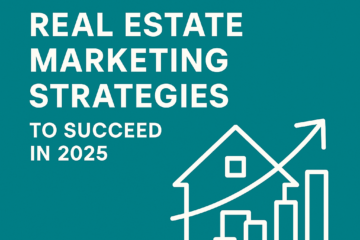Mastering Real Estate Marketing: Strategies to Attract and Convert Buyers in 2025
The real estate industry is evolving rapidly, and staying ahead of emerging trends is key to success in a competitive market. As technology advances and consumer expectations shift, marketing strategies must adapt to meet new demands. Today’s buyers are tech-savvy, expect personalized experiences, and seek innovative ways to explore properties.
At Next Level Listings, we focus on the future of real estate marketing. AI-driven tools and immersive virtual experiences are transforming how properties are marketed and sold. In this blog, we explore the most exciting trends that will redefine the industry in 2025 and beyond.
AI-Powered Property Listings and Personalized Marketing
Artificial intelligence (AI) is revolutionizing real estate by offering personalized property recommendations and automating marketing efforts. With AI-driven chatbots and virtual assistants, buyers can easily find homes that match their preferences. Additionally, predictive analytics allow sellers to price and market properties more effectively. By leveraging these tools, real estate professionals can enhance efficiency and build stronger connections with potential buyers.
Real estate professionals are utilizing AI to:
✔ Generate dynamic listing descriptions: AI tools create tailored property descriptions that highlight unique features and attract the right audience.
✔ Analyze market trends for optimized pricing: Predictive analytics help agents anticipate market shifts, ensuring listings remain competitive.
✔ Develop hyper-targeted ad campaigns: AI analyzes consumer behavior, enabling agents to craft ads that resonate with specific buyer segments.
For more insights into AI in real estate, visit Forbes Real Estate Council.
The Rise of 3D Virtual Tours and Augmented Reality (AR)
High-quality photos and videos remain essential, yet 3D virtual tours and AR experiences are becoming game-changers. These tools allow buyers to explore homes interactively, enhancing engagement and decision-making.
🔹 3D Virtual Tours: Buyers can walk through a home remotely, zooming in on details to get a true sense of the space. This technology offers an interactive view, helping buyers narrow options before scheduling in-person visits.
🔹 AR Home Staging: Augmented reality lets buyers visualize different furniture layouts, colors, and finishes. Seeing potential design possibilities increases their emotional connection to the home, making a sale more likely.
Explore AR and 3D technology in real estate on Realtor.com and Zillow’s Virtual Tour Feature.
Social Media: Short-Form Video Dominance
Short-form video content is reshaping social media, and real estate is no exception. Platforms like Instagram Reels, TikTok, and YouTube Shorts have revolutionized property marketing. These engaging, shareable videos offer a compelling way to showcase properties, capturing potential buyers’ attention quickly.
📌 Key Video Trends in 2025:
✔ Property teaser videos (10-30 seconds): Short, captivating clips highlight a home’s best features and spark interest.
✔ Behind-the-scenes real estate content: Personal moments, such as prepping homes for sale or hosting open houses, build stronger connections with buyers.
✔ Educational videos on home-buying and market trends: Informative content on mortgages, home inspections, and local markets positions agents as trusted authorities.
✔ Agent-led virtual tours with engaging narration: Personalized video walkthroughs help buyers feel connected to the property and agent.
For more insights into real estate video marketing, check out The National Association of Realtors.
Data-Driven Social Media Advertising
Paid advertising has become more sophisticated, with AI and machine learning optimizing social media campaigns. These technologies ensure ads reach the right audience efficiently.
✔ Target potential buyers based on location, interests, and behavior: AI enhances targeting, ensuring ads appear at the right time to the right people.
✔ Use retargeting ads to re-engage interested buyers: Reminder ads keep properties top of mind for those who previously viewed a listing.
✔ A/B test ad creatives for effectiveness: Experimenting with visuals, messaging, and calls-to-action refines strategies for better engagement and conversions.
Learn more about real estate advertising strategies at HousingWire and Adweek’s Real Estate Marketing Guide.
Sustainable and Smart Home Features in High Demand
Today’s buyers prioritize sustainability and smart technology. Eco-friendly homes with energy-efficient appliances, smart lighting, and sustainable materials are more appealing than ever. Green building practices and energy-efficient solutions increase property desirability, particularly in urban and luxury markets.
Additionally, buyers are drawn to smart home features such as:
🔹 Smart security systems: Video doorbells, smart locks, and motion detectors enhance home security and convenience.
🔹 Voice-controlled assistants (Alexa, Google Home): These devices simplify home management, from adjusting lighting to setting climate controls.
🔹 Automated climate control for energy efficiency: Smart thermostats like Nest and Ecobee optimize energy use, reducing costs and increasing home value.
To explore the latest smart home trends, visit Smart Home Magazine.
Final Thoughts: Staying Ahead in Real Estate Marketing
The future of real estate marketing is driven by technology, personalization, and digital engagement. AI-powered insights, immersive virtual experiences, and short-form video content are transforming how buyers interact with properties. By embracing these innovations, real estate professionals can stand out, improve marketing efforts, and drive more conversions.
At Next Level Listings, we stay ahead of industry trends to help professionals elevate their listings and maximize exposure. Follow us for the latest real estate marketing insights, updates, and expert advice!

